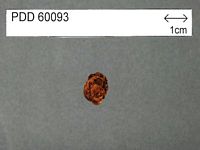|
 Hysterangium youngii Hysterangium youngii
BiostatusPresent in region - Indigenous. Endemic
Images (click to enlarge)
Caption: Fig. 8 Hysterangium youngii. A, Basidiomata exterior and in section (PDD 60093, Trappe
9878 (OSC)). B, Basidiospores in optical section by bright field (PDD 60093). C,
Basidiospores in surface view by bright field (PDD 60093). D, Basidiospore b | 
Caption: Dried type specimen
Owner: Herb PDD |
Article: Castellano, M.A.; Beever, R.E. (1994). Truffle-like Basidiomycotina of New Zealand: Gallacea, Hysterangium, Phallobata, and Protubera. New Zealand Journal of Botany 32(3): 305-328 (http://www.rsnz.org/publish/abstracts.php).
Description: Basidiomata up to 1 cm diam., subglobose to irregularly lobed, white, bruising brown
when fresh, dark brown with pale brownish white areas when dried, surface wrinkled
when fresh. Gleba firm, cartilaginous, dark green; locales irregular, partially filled, some
contiguous with peridium. Rhizomorphs few, small (<1 mm diam.), attached to base,
concolorous with peridium. Columella much reduced, dendroid, translucent. Taste not
noted. Odour nil. Peridium not separable from gleba, a single layer 400-450 µm thick,
of thin-walled, irregularly inflated hyphae, 20-35(-40) µm diam., smaller and more or
less periclinal near gleba and peridial surface, outer portion (100-150 µm) golden brown
and encrusted with soil particles, inner portion (250350 µm) hyaline without
incrustations, clamp connections absent. Trama up to 80 µm thick, of hyaline, thin-walled,
interwoven hyphae, 3-4 µm diam., in a gelatinised matrix, clamp connections
absent. Basidia not observed. Spores minutely to moderately
verrucose, 18-20(-22) x 6-7
µm, ellipsoid to fusoid, some asymmetric; apex acuminate to mostly papillate, base with
a sterigmal attachment 1 µm long x 2 µm wide; wall 1-1.5 µm thick, thicker at spore
apex. Utricle wrinkled, adherent, up to 1 µm thick. Spore colour in KOH pale green
singly, olive brown in mass.
Habitat: Habitat: hypogeous in podocarp-broadleaf forest, probable mycorrhizal associates
uncertain. Season: April.
Distribution: New Zealand.
Notes: ETYMOLOGY: Named for the collector of the type, Roy Young of Grants Pass, Oregon.
REMARKS: Known only from the type collection.
Hysterangium youngii has the largest spores of any Hysterangium species in New
Zealand. It resembles H. salmonaceum Beaton, Pegler & Young from Australia in spore
size and shape, but can be distinguished by its ornamented spores.
|